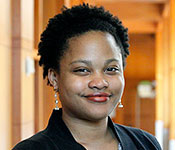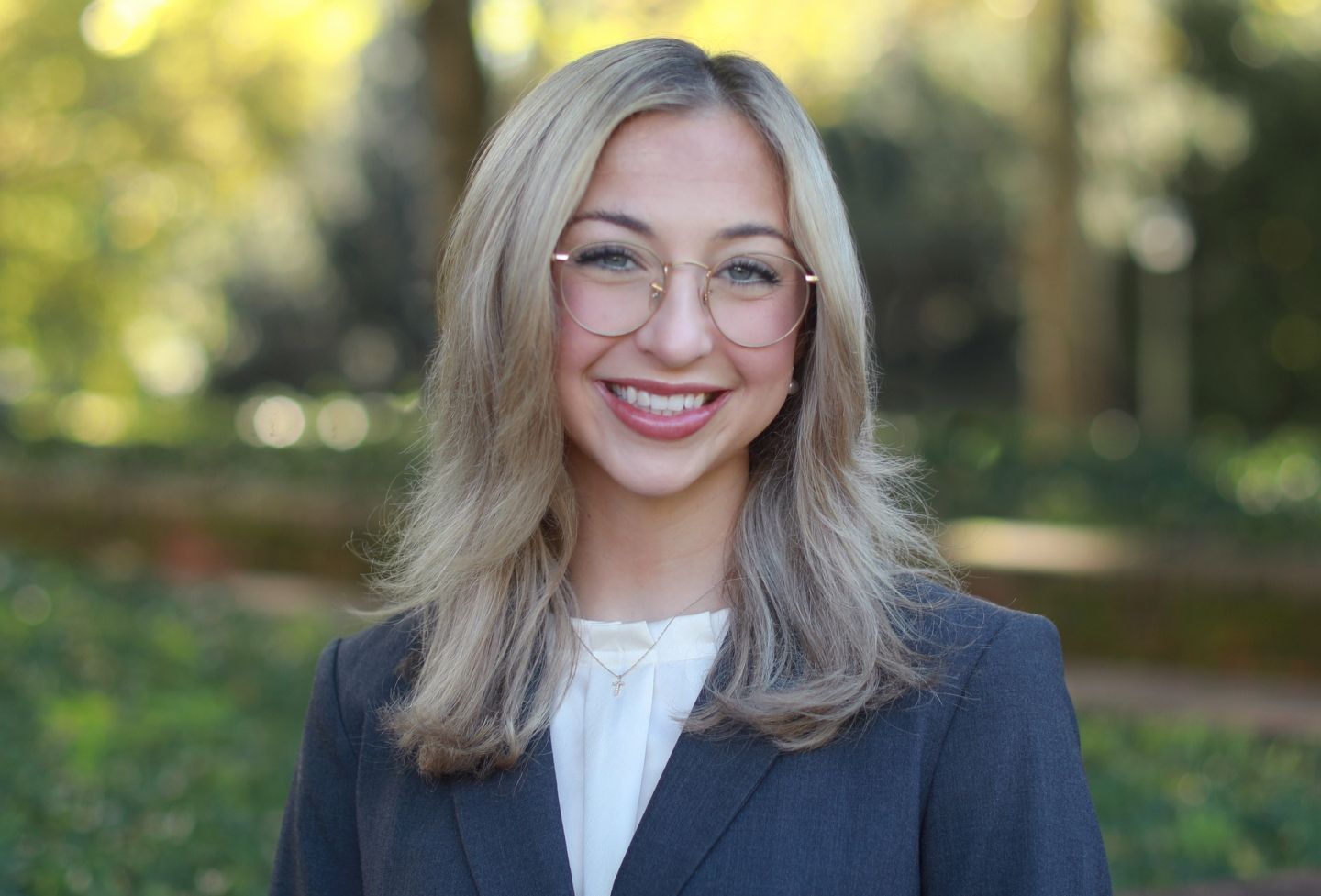Instead of spending her fall semester in classes in Charlottesville, third-year University of Virginia law student Laura Prebeck worked full-time at the U.S. Department of Justice, helping to investigate and prosecute corporations and others suspected of bribing foreign officials in violation of the Foreign Corrupt Practices Act.
"Not only was I able to gain substantive knowledge of criminal procedure, but I also gained real insight into prosecutorial decision-making within the Justice Department," Prebeck said. "By working at the DOJ full-time, I had the flexibility to attend a range of meetings, help out with time-sensitive assignments, and take on longer-term research assignments."
Prebeck was one of nine UVA Law students to participate in the Law School's new UVA Law in DC externship program, in which students earn academic credit while working 40 hours per week at government agencies or nonprofit organizations in Washington under the supervision of a lawyer.
"I was really lucky to be paired with a great supervising attorney," Prebeck said. "Because I worked directly with him over the course of the semester, I was able to see my work contribute to his. It was very satisfying to hear my research referenced in a meeting with defense counsel, or to see my writing integrated into a larger memo or report."
As part of UVA Law in DC, the students also attend a weekly seminar in Washington, complete directed reading and writing assignments, and write a research paper on an approved topic relevant to the host organization's work, for a total of 12 credits.
In the fall, the weekly seminar featured a number of prominent guest speakers, including Peter Vincent '95, principal legal adviser at U.S. Immigration and Customs Enforcement; Chinh Le '00, legal director of the Legal Aid Society of the District of Columbia; and Jim Brown '76, chief of staff to U.S. Sen. Robert Casey. Along with the new UVA Law in DC program, the Law School also has expanded its full- and part-time externship programs.
In the fall, the students worked in a wide range of host organizations, including state, local and federal prosecutors' offices, public defenders' offices, legal aid organizations, government agencies, and nonprofits dealing with economic development, environmental protection, civil liberties and politics. (Full list of fall 2013 externship host organizations)
"Overall, the students had such a variety of experiences and they learned so much," said Director of Externships A. Sprightley Ryan. "That's one thing I heard from every student, was how much they learned — working with lawyers, having mentors, and, in the case of people doing client service, tons and tons of client contact."
Part-time externships are primarily local and require students to work 10 hours per week at host organizations, as well as complete reading and short writing assignments.
Full-time externships can be located anywhere and require 40 hours of work per week at host organizations, as well as a substantial research paper on a topic relevant to the organization's work.
"[Externships are] a tremendous opportunity for the students who are interested in gaining this type of experience and learning through working as a supplement to the traditional law school classroom," Ryan said.

Third-year law student Michelle Carmon was one of 12 students who completed a part-time externship in the fall. Carmon worked Mondays and Wednesdays in the Virginia attorney general's office's Medicaid Fraud Control Unit, focusing on civil cases involving fraud against the Virginia Medicaid program.
As part of her work there, Carmon researched issues such as fraud in managed care organizations and the preservation of claims against defendants in bankruptcy, and she assisted with preparing litigation by drafting case-opening memos, reviewing complaints and disclosure documents, observing whistleblower interviews and more.
"This externship was one of the highlights of my time at UVA," she said. "I would recommend it to any 2L or 3L interested in this substantive area of law, or even government work more generally."
The experience gave Carmon practical experience with the law of Medicaid as it relates to the federal False Claims Act and Anti-Kickback Statute, Virginia's Fraud Against Taxpayers Act, the structure of managed care organizations, and federal regulations involving reimbursement and medical billing.
"I had ample opportunities every day to review complaints and discovery materials, conduct legal research, review cases and statutes, and much more," she said. "This helped me improve my legal writing, gain some litigation experience and have some practice formulating and evaluating legal theories."
Carmon, who recently accepted a position as an assistant district attorney in New York, said her externship exposed her to a different side of the law. "I found this area of the law to be incredibly interesting and I feel that protecting the Medicaid program from fraud and abuse is very important work," she said. "If I decide to leave criminal practice in the future, I could see myself returning to this area of law."
Ten law students externed full-time in the fall, working at host organizations in New York, California, Georgia, Virginia, North Carolina, Texas and Illinois. Third-year law student Annalise Lisson had a full-time externship working in the major crimes division of the U.S. Attorney's Office of the Northern District of Georgia.
"I was able to take on long-term projects and fully participate in in a two-week trial," Lisson said. "About half of my work related to sex and labor trafficking investigations, and I spent the other half of my time on a marriage fraud case, United States v. Rex Anyanwu."
For the Anyanwu trial, Lisson contributed to strategy development, drafted the government's pretrial motions, assisted in writing opening and closing arguments, created exhibits to be used in evidence, helped prepare and interview witnesses, and independently handled the direct examination of 11 government witnesses. "By the end of my time in the office, I had participated in almost every aspect of federal prosecution, from the earliest stages of investigation through appellate oral arguments," she said.
Lisson said the externship was one of the most meaningful experiences she's had in law school.
"I have always liked criminal law classes, so I especially enjoyed opportunities to make evidence suppression arguments and discuss search and seizure practices with FBI agents," she said. "I also gained experience in trial preparation, jury selection and developing a courtroom presence, all of which are difficult to simulate in law school, even in trial advocacy."
Following graduation this spring, Lisson will return to Atlanta for a clerkship and will then join a firm, where she hopes to work in support of its white-collar practice.
"The group often represents clients in matters pending in the Northern District of Georgia, so the work would allow me to continue building on my externship experience and the relationships I established in the Atlanta office this semester," she said. "In several years, I can see myself applying for a position in the U.S. attorney's office."
Founded in 1819, the University of Virginia School of Law is the second-oldest continuously operating law school in the nation. Consistently ranked among the top law schools, Virginia is a world-renowned training ground for distinguished lawyers and public servants, instilling in them a commitment to leadership, integrity and community service.


